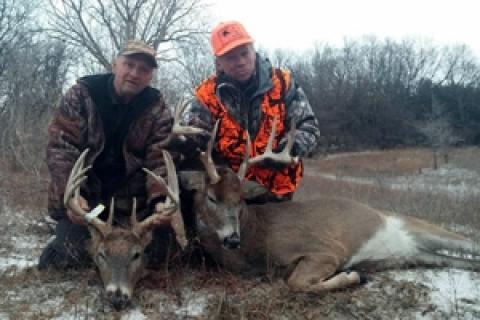
This past December I found myself with a lot of time to think. I was on a three-day late-season muzzleloader hunt for whitetails in western Illinois, and it was a tough hunt. I was very optimistic about this hunt, as I had taken a nice buck in southeastern Illinois the year before with a different outfitter, and I knew that this outfitter too has produced a lot of big bucks over the years in an area known for its trophy potential. Long hours sitting in tree stands and ground blinds without seeing any shooters, however, gave me the opportunity to reflect on what it takes to be successful when hunting post-rut whitetails in the north, east or midwest.
 |
| These two dandy late-season Iowa bucks were the result of "hunting deer smart." Photo courtesy of Ron Bumbarger |
Late-Season Bucks are Hungry
Late-season hunts are about hunting food sources, whether crops such as standing or harvested corn or beans, or food plots of some sort planted for deer. Late-season bucks are basically recuperating from two months of intense activity and that means they need plenty of food, preferably of the high-protein variety, as they get ready for the long winter ahead.
Acorns are a Whitetail's Favorite Food
By all accounts, the Illinois acorn crop had been a bumper one that past year (and apparently sweet too!). White acorns are probably a whitetail's favorite food, and with the woods loaded with them, the bucks had little reason to leave their bedding areas, at least not during daylight hours. There's really not much that you can do about this, but monitoring the condition of the acorn crop in your area during the early part of the season can at least give you an idea of what things might be like in December.
Hope for Cold Weather
Usually the key to late-season success is cold, snowy weather that forces the deer to feed later in the morning, earlier in the evening, and perhaps even during the day when temperatures are warmer. Ideally this weather will set in several days before your hunt so that the deer are really coming to the fields to feed by the time you are out there. Again, there's not much you can do if the weather doesn't cooperate, but you can watch the forecast ahead of your hunt and govern yourself accordingly in terms of your trophy standards. In my case, it arrived during the hunt, but the deer were still able to easily paw through a few inches of snow to find acorns, so they simply did not hit the food plots with any earnest. (Here are some tips for Staying Warm When Hunting in Extreme Cold).
Hunting Soft and Quiet
The bottom line is you simply have to try to keep the pressure low. This means only hunting a stand when the wind is in your favor, and walking to your deer stand rather than driving up close or taking an ATV, even if it's a long walk. Hunting late-season bucks means hunting soft and quiet, as these bucks are looking for quiet rest to recover from the rut and they have a low tolerance for disturbance. They have survived the various hunts that have taken place over the previous three months or so, and they are jumpy and quick to hunker down or get out of town. I certainly saw this with the few deer that I encountered on my hunt.
Hunt Smart
Some cautious outfitters I know only hunt the evenings this time of year to not to disturb the deer in the morning as they head back to their bedding areas. Andy Wulf, the owner of Whitetail Ridge Outfitters in Iowa, feels that because the deer tend to bed within just a couple hundred yards of their food sources this time of year, walking in just before dawn to hunt the field edges will push the deer off the field and likely right through their bedding areas too. So he prefers that his hunters wait for the deer to bed and then walk in mid-morning to hunt the field for the rest of the day. If a client really wants to hunt all day, he will take them to their stand a few hours before daylight, as he feels that this will usually not push the deer off the fields as much because of the complete darkness and because there are not as many deer feeding that early. He feels that since tagging a mature buck in the morning during the late season is uncommon anyway, this strategy is just plain "hunting smart" and playing the odds.
Good hunting.
- 8100 views

